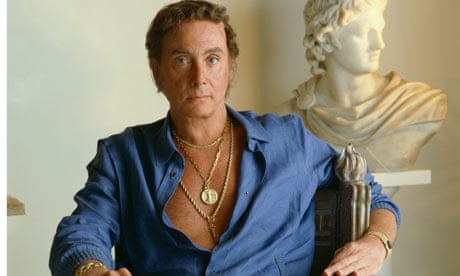The American pornography publisher Bob Guccione, who has died of cancer aged 79, made and lost a fortune with the explicit nudes in his magazine, Penthouse. Guccione launched the glossy, lushly designed Penthouse in the UK in 1965 while working in London as a part-time cartoonist and columnist. The first issue sold out in a few days and the magazine's success led him to return to America in 1969 to launch the first US issue, challenging Hugh Hefner's Playboy.
The sexual revolution was at its height and Guccione had consciously decided to break a "cultural barrier", as it was politely termed. Less politely, his magazine launched the "pubic wars" – a back-and-forth rivalry with Playboy over increasingly revealing photographs of the pin-up of the month. While Hefner's pinups were dubbed Playmates, Guccione's centrefold models – whom he sometimes photographed himself – were named Penthouse Pets.
Although Penthouse published some quality writing by authors including Philip Roth and Joyce Carol Oates, Guccione purposely went downmarket from Playboy with racier news stories, scandal coverage and tabloid headlines. This dramatically successful formula pushed circulation to nearly 5m by the late 1970s. His company, General Media International, also owned the women's magazine Viva, which ran male nudes; the popular science journal Omni; a sex advice magazine; a health publication called Longevity; books; and a merchandising branch.
Guccione turned his hand to film production with the extravagant, soft-porn movie Caligula (1979), starring Helen Mirren, Peter O'Toole and John Gielgud. The film flopped and was a critical disaster, but it later became one of Penthouse's most popular DVDs.
"The Gooch" dressed vulgarly in unbuttoned shirts, tight trousers and heavy gold neck chains, but he was no partygoer. He preferred to stay at home with Kathy Keeton, his business partner and third wife, in his elaborate New York mansion, which cost $5m a year to run and was reputedly one of Manhattan's largest dwellings.
Guccione was outspoken. When a magazine asked him if the government should be able to restrict the Penthouse cover price, Guccione replied: "I don't think that Dick Nixon or Gerald Ford have the right, the intelligence, the knowhow, or the talent to control anything other than their own bowel movements, and even that is somewhat in doubt."
Such talk made him powerful enemies. In 1986 a government pornography inquiry, ordered by President Ronald Reagan, issued harsh criticism of Penthouse, and thousands of shopkeepers removed it from their racks, leading to a plunge in advertising. The previous year he had to pay $45m in back taxes. Guccione had also decided to build a casino in Atlantic City but, he later alleged, the FBI immediately began to investigate him on suspicion of mafia connections. The casino was never built and the project swallowed more millions.
In the magazine's early years, Guccione had used Penthouse to subsidise his work as an artist. In his later years, his own paintings were hung on his mansion walls, where there had once been works by Picasso, Degas, Dalí, El Greco and Modigliani – all sold off, as he lost his once-booming media enterprise.
Bad business decisions cost Guccione, once worth an estimated $200m, his fortune (though rumours of a Swiss bank account persisted). General Media filed for bankruptcy in 2003, by which time Guccione had undergone an operation for oral cancer. A businessman saved him from eviction in 2004, paying $24m to his creditors. Penthouse was sold to a private equity firm that same year and Guccione was soon dropped as a consultant. It was all over.
Guccione was born in Brooklyn, New York, to Sicilian-American parents, Anthony and Nina. His father was an accountant. For a while Bob, an altar boy, considered the priesthood, but he succumbed to art and, after graduating from Blair academy, New Jersey, in 1948, he departed for California. The following year he married Lilyan, who gave birth to a daughter, Tonina. They then left for Europe, where Guccione wanted to pursue painting. They lived in Rome and Paris, but money was short and in a few years Lilyan had returned to California.
Guccione met a singer, Muriel Hudson. They married in 1956, moved to London and had three sons, Bob Jr, Tony and Nick, and a daughter, Nina. At first Guccione earned a living running a drycleaning chain, but he then found work as a journalist and started preparing Penthouse. The second issue of the magazine sarcastically mentioned Keeton, an exotic dancer at a London nightclub. When Keeton's manager complained to Guccione, he visited the dancer in her dressing room. He was impressed to find her reading the Financial Times, and soon split with his wife and began living with Keeton. They eventually married in 1987.
Keeton managed Penthouse's finances, and Guccione's elder sons, Bob Jr and Tony, also joined General Media, but they fell out with their father over his business decisions as Penthouse's circulation declined. Bob Jr started the music magazine Spin in the mid-1980s with a loan from his father, who later withdrew his investment.
Keeton died in 1997. Guccione is survived by his children and his fourth wife, April, whom he married in 2006.
